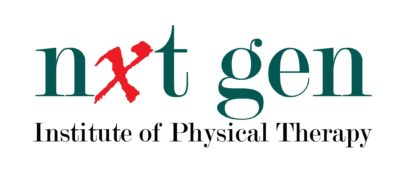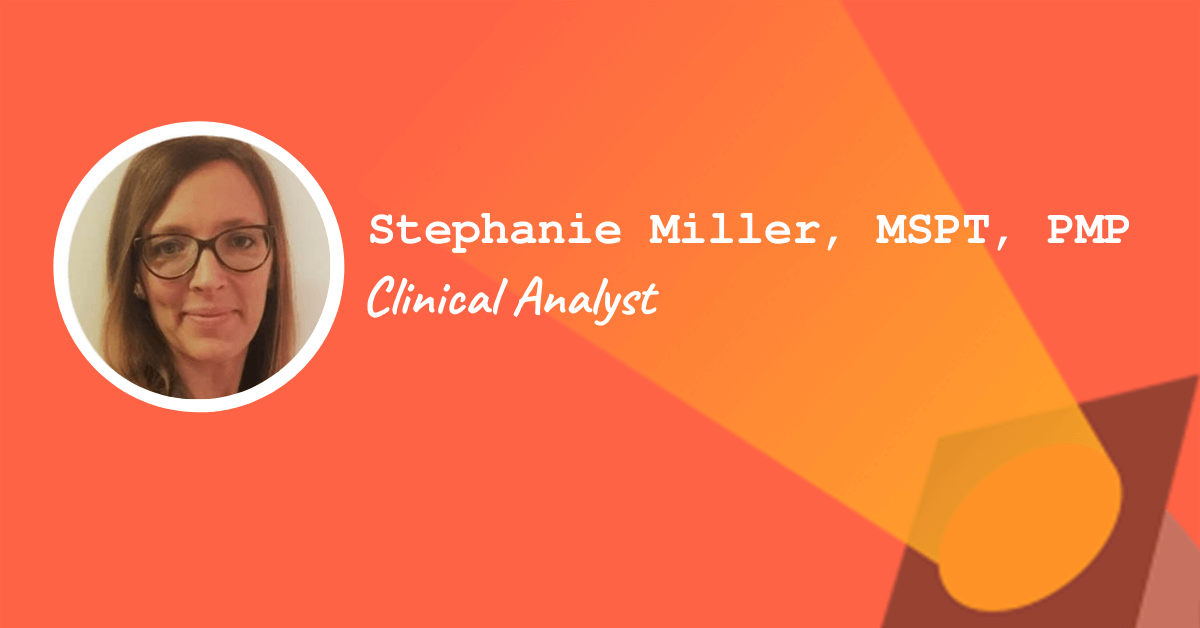Today’s non-clinical spotlight focuses on Stephanie Miller, MSPT, PMP, who went from physical therapist to clinical analyst and project manager.
This post may contain affiliate links or codes. This won’t increase your cost, but it helps keep TNCPT alive, and free of annoying ads! Thank you for your support. 🙂
What is your full name and title?
Stephanie Miller, MSPT, PMP – Full-time Clinical Implementation and Support Analyst at TransformativeMed, Inc. and contract Project Manager at Nxt Gen Institute for Physical Therapy.
Where did you go to PT school, and when did you graduate?
Thomas Jefferson University – 2003
What did you do when you first finished PT school?
Worked in an outpatient clinic.
How long did you do it, and what did you like and dislike about it?
I worked in outpatient about two yrs. I enjoyed it, but my heart was pulling me toward geriatrics. I transitioned to working in a SNF, and then after taking on PRN work in home health, switched to home health full-time after about a year.
At what point did you decide you might want a change?
I’ve always been fascinated by finding ways to improve efficiency at less exciting tasks in order to allow more time for doing the things I enjoy most.
That fascination carried over into my career. I started home health on a paper documentation system, so transitioning to computers wasn’t the easiest for a lot of us. I wanted to keep my hands and attention on my patients, so I developed methods of improving efficiency in my documentation and managing my time more effectively to reduce any potential negative impact the new technology may have on my patient care.
Because I became a superuser on our EMR, I was given the opportunity to work on our Merger & Acquisition team, training new team members on our documentation system.
Outside of classroom training, I was able to assist with patient care and perform ride-alongs with my new teammates. There, I demonstrated the benefits of the electronic documentation system, like having real time data, while educating on methods of reducing any potential barriers it may pose to patient care.
Because of those experiences, I was asked to become part of our staff development team.
Up to that point, staff development had consisted of an all nursing team, so it was an awesome opportunity to be the first rehab team member.
Although I enjoyed every role I had, as I began to travel more with my job, I realized how much I enjoyed experiencing new areas and learning about regional cultures and communities. So I thought, why not see more of the country and become a traveling PT?
What I took for granted at my current job, though, was the ability to work closely with an amazing IT team to improve our EMR and make it more user-friendly for clinicians.
Once I started traveling, I realized just how lucky I had been to work with such a great IT team that listened to clinicians’ needs and created a documentation system based on user feedback and clinical workflow.
I came to realize that it wasn’t like that everywhere.
When did you know you wanted to go non-clinical?
Although I loved patient care, I was realizing the barrier the EMR was for a lot of providers, and wondered how I could make a positive impact in that area.
I’d miss directly working with patients, but I learned at my prior job that I could touch 6 patients a day or I could touch 10 providers who touched 6 patients a day.
My passion had changed to making technology more effective and efficient for our providers to do what they love most, treat their patients and give them their undivided attention.
What are you doing in your current role as a clinical analyst? What is the name of your title and your organization?
I’m a Clinical Implementation and Support Analyst at TransformativeMed, Inc.

Currently, I work as a translator of sorts between our clients and our tech team, although I also am learning coding and some beginner-level build work, as well.
My primary role is working with our customers to ensure the product we deliver meets their workflow needs, enhances team communication, and brings the most meaningful patient data directly to the providers.
I also work as a contracted project manager for Nxt Gen Institute of Physical Therapy, where I get to stay connected with the physical therapy world and am part of a lot of exciting new programs.

How did you land these roles?
In the myriad of roles I had over the years, I had the opportunity to see multiple levels of the healthcare industry at the same time. This unique experience allowed me to see gaps in the system that those with one primary role don’t always get to see.
I wondered how things got lost in translation from a grand idea at the top to what was actually being implemented at the provider level.
I wanted to learn how to bring management’s ideas into fruition at the field level.
After researching different areas of study, I landed on project management. I took a certification course and passed the PMP exam. My background in managing implementation of EMR training during mergers and acquisitions—coupled with formalized education in project management—is what helped me move into my current full-time role.
How long have you held the role of clinical analyst?
I’ve worked at TransformativeMed as a clinical analyst for approximately one year and two months. I’ve worked at Nxt Gen Institute for Physical Therapy as a project manager for approximately five months.
Is the role full-time? Part-time? Do you still treat patients in the clinic?
I’m full-time at TransformativeMed and contract at Nxt Gen. I still consider working in the field PRN, but currently my goal is developing my project management skills, so I’m devoting my time and energy to that right now.
What is a day in the life like for you at your role as a clinical analyst?
Regarding my full-time job, my morning is typically filled with client meetings to discuss project implementation or general touchpoints. Project implementation involves rolling our product out to a new client or hospital.
My goal is to ensure we’re staying on track with their project plan and that the product is customized to meet their needs.
Touchpoints are routine meetings with existing clients to ensure the product continues to meet their needs and make adjustments as needed.
Then, the afternoon is spent working on technical build requests gathered during my morning meetings and communicating to the tech team the items that require their assistance. Afternoons also involve team collaboration to ensure everyone is on the same page about upcoming work and projects, to prioritize our worklists, and review project timelines.
What are the biggest challenges and rewards (or pros/cons) of your current role?
As a clinical analyst, the two biggest challenges for me were:
- That our product is hospital-based and my primary background is in home health
- I had limited technical skills regarding computer coding.
However, I’ve learned a lot about hospital workflows from my teammates and through meetings with our clients, and have come to realize that facilities are generally different, so no matter how much experience you have, you still can’t know everything.
And regarding technical skills, I have a great team that has provided mentorship and I’m constantly blown away by what I’ve learned in just under a year. And now that I’m beginning to understand some forms of coding, I’ve been researching on-line coursework to further my technical skills.
What makes someone a good fit for what you’re doing?
For my role as an analyst, communication skills are key. I rarely meet with a client in person, so a lot of communication is via email or web meetings.
Understanding the nuances of email etiquette, the importance of the basic communication model, and meeting management are paramount in maintaining good relationships and ensuring everyone is on the same page about the work being completed.
Being organized is also important to keep track of timelines, work to be completed, and who’s working on which tasks. Studying project management really helped with that.
If someone else wanted to pursue a similar role, what do you recommend doing? Cold applying to jobs or networking? Both?
My advice is to honestly see what new roles or skills you can gain at your current job to test out what you enjoy doing.
For me, I never would have imagined taking the leap from patient care to working at a tech startup. But through opportunities at my home health job, I learned that I enjoyed public speaking, organizing schedules, having a role in bringing projects to fruition, and working with our tech team to enhance our product.
I’d recommend researching analyst job posts and when you land on a role that’s enticing, see what skills/experience are required.
Then, see what opportunities you have at your current job, volunteer organizations, committees, etc. to gain experience in those areas, and most importantly, to find out if you enjoy those tasks.
I found my current job on LinkedIn, but also looked at general job postings online. There are a lot of clinical analyst/informatics roles out there, but many did seem to require nursing backgrounds.
I like to hope that the more we prove ourselves in these fields, the more our opportunities will grow.
Do you have any special advice for someone considering doing what you’re doing?
If you’re struggling with leaving patient care, I understand the feeling. I went through a phase of identity loss myself.
The main thing to know is that there are plenty of opportunities to stay connected: PRN work is a great option, getting involved in the APTA or local chapter, writing about your PT experiences and inspiring other therapists, etc.
And keeping in mind that even though you may not be directly touching a patient that day, if you’re involved in an area of health care that is affecting providers, you could be impacting more patients than you ever imagined.
What’s next for you? Where do you see yourself going in your career?
I really believe in the products TransformativeMed has created and, most importantly, our team is passionate about improving patient care and enhancing provider workflow.
I find joy in where I’m at every single day. For me, I’ve definitely experienced job dissatisfaction, so my goal isn’t aiming at a title or salary or the “what’s next.”
As long as I feel that I’m making a positive difference in the health care industry and enjoy getting up for work every day, I’m really quite content in that.
If that ever changes, then I’ll think about a what’s next, but for now, being content is enough for me.
Do you have any books or podcasts you recommend to people wanting to pursue a path like yours?
Podcast:
The Project Management Podcast by Cornelius Fichtner
Courses:
Certificate in Project Management
Exam:
PMP certification (See another spotlight on a PT who got her PMP cert and now works as an operations manager!)
And just an all around life changing book that helped me through my journey:

Thanks for your insight, Stephanie!







